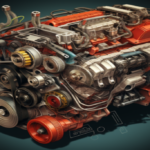Introduction:
Climate change is one of the most pressing global challenges of our time, and it requires immediate action to mitigate its adverse effects. Transportation is a significant contributor to greenhouse gas emissions, primarily through the combustion of fossil fuels in conventional vehicles. As a response to this environmental concern, hybrid cars have emerged as a promising solution, bridging the gap between traditional internal combustion engines (ICE) and fully electric vehicles (EVs). This essay aims to explore the role of hybrid cars in combating climate change by examining their environmental benefits, technological advancements, and potential challenges.
1. Environmental Benefits of Hybrid Cars:
- Reduced Greenhouse Gas Emissions: Hybrid cars combine an internal combustion engine with an electric motor, resulting in significantly reduced greenhouse gas emissions compared to conventional vehicles. The electric motor assists the combustion engine, reducing fuel consumption and tailpipe emissions. This leads to a decrease in carbon dioxide (CO2) and other harmful pollutants such as nitrogen oxides (NOx) and particulate matter (PM), which contribute to air pollution and climate change.
- Increased Fuel Efficiency: Hybrid cars employ advanced technologies like regenerative braking and engine start-stop systems to enhance fuel efficiency. Regenerative braking allows the electric motor to capture and convert kinetic energy during deceleration or braking into electrical energy, which can be stored in the battery and later used to power the vehicle. Engine start-stop systems automatically shut off the engine when the car is stationary, further conserving fuel. These features result in reduced reliance on fossil fuels, promoting energy conservation and reducing carbon footprint.
- Transition to Electric Mobility: Hybrid cars act as a stepping stone towards full electrification of the transportation sector. While fully electric vehicles offer zero tailpipe emissions, their adoption faces challenges such as limited charging infrastructure and range anxiety. Hybrid cars provide a practical and flexible alternative, allowing drivers to benefit from electric power while still having the option to rely on the conventional combustion engine. This helps in the gradual transition to electric mobility and facilitates the development of supporting infrastructure.
2. Technological Advancements in Hybrid Cars:
- Plug-in Hybrid Electric Vehicles (PHEVs): Plug-in hybrid electric vehicles combine a larger battery pack with an internal combustion engine and offer extended electric-only driving range. PHEVs can be charged through external power sources, enabling them to operate solely on electric power for longer distances. By maximizing electric range and minimizing dependence on fossil fuels, PHEVs contribute to significant emissions reductions, particularly for daily commutes and short trips.
- Advancements in Battery Technology: Hybrid cars rely on advanced battery technology for storing and delivering electric power. Ongoing research and development in battery technology have led to improvements in energy density, charging speed, and durability. These advancements increase the overall efficiency and performance of hybrid cars, allowing them to cover longer distances in electric mode and reducing the need for frequent charging.
- Integration of Renewable Energy: Hybrid cars can further contribute to combating climate change by integrating renewable energy sources into their charging process. By utilizing solar panels or renewable energy grids to charge their batteries, hybrid vehicles can reduce their carbon footprint even further. This integration promotes the utilization of clean energy and helps accelerate the shift towards a sustainable energy ecosystem.
3. Challenges and Future Perspectives:
- Cost and Affordability: Hybrid cars often come with a higher upfront cost compared to conventional vehicles, primarily due to the advanced technologies and battery systems they incorporate. However, as technology advances and economies of scale are achieved, the costs are expected to decrease, making hybrid cars more accessible to a wider range of consumers.
- Infrastructure Development: Hybrid cars require a charging infrastructure that supports their electric mode. While plug-in hybrids can be charged through regular power outlets, the availability of public charging stations remains a challenge, particularly in certain regions. Governments and stakeholders need to invest in the expansion of charging infrastructure to encourage the adoption of hybrid cars.
- Awareness and Education: Increasing public awareness about the environmental benefits of hybrid cars is crucial for their widespread adoption. Educating consumers about the advantages of hybrid technology, fuel efficiency, and emissions reductions can help dispel myths and misconceptions, fostering a positive perception and acceptance of these vehicles.
Conclusion:
Hybrid cars play a vital role in combating climate change by reducing greenhouse gas emissions, enhancing fuel efficiency, and facilitating the transition to electric mobility. The environmental benefits offered by hybrid technology, along with ongoing advancements in battery technology and the integration of renewable energy sources, contribute to a greener transportation sector. Although challenges such as cost, infrastructure development, and public awareness persist, these obstacles can be overcome through continued research, development, and collaborative efforts among stakeholders. With further advancements and increased adoption, hybrid cars have the potential to significantly mitigate climate change and create a more sustainable future.







